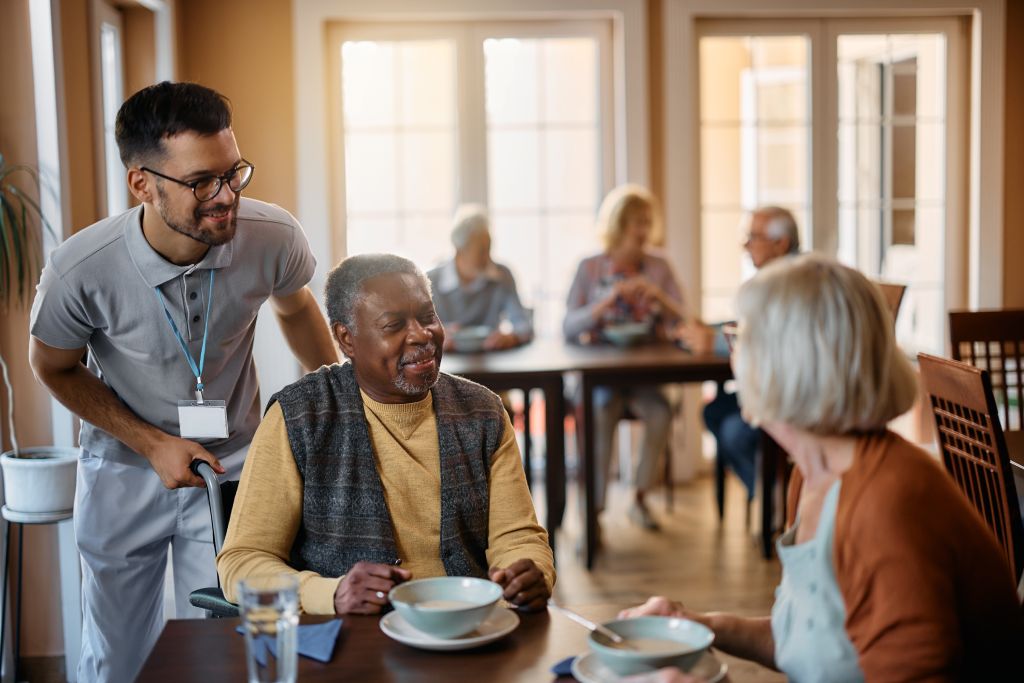Learn about tailored Assisted Living plans for elderly residents.
Learn about tailored Assisted Living plans for elderly residents.
Blog Article
Exactly How Aided Living Facilities Enhance High Quality of Life for Those With Dementia
Aided living facilities play a crucial duty in enhancing the lifestyle for individuals with mental deterioration by applying customized care methods that satisfy their unique demands. These atmospheres combine structured tasks with emotional assistance, fostering a sense of community while making certain safety and freedom. The integration of engaging programs and family members involvement additionally improves the locals' experience. Yet, the complexities of mental deterioration care remain to advance, prompting a more detailed assessment of just how these facilities adapt and introduce to fulfill the challenges dealt with by homeowners and their families. What ramifications does this have for future care designs?
Personalized Care Plans
(Dementia Care Charlotte)In many cases, individuals with dementia require tailored support that addresses their special needs and preferences. Personalized care plans are essential in assisted living setups, as they make certain that each resident obtains ideal focus and solutions. These strategies are developed collaboratively, involving healthcare professionals, caregivers, and member of the family to produce a detailed review of the person's case history, cognitive capabilities, and personal passions.
A well-structured personalized treatment plan normally consists of certain goals associated with health and wellness administration, everyday activities, and social engagement. It accounts for the individual's cognitive decrease while promoting independence and dignity. Regular analyses and updates to the treatment strategy are essential, as they permit for adjustments based on the resident's evolving condition and choices.
Trick elements of these plans often include medicine management, behavior assistance techniques, and dietary guidelines tailored to the individual's requirements (Assisted Living). By concentrating on individualized treatment, helped living centers can promote an encouraging environment that enhances the quality of life for people with dementia, ultimately adding to their overall well-being and joy. This customized technique values the uniqueness of each citizen, ensuring they obtain the compassionate treatment they need

Engaging Tasks and Programs
Engaging homeowners in significant tasks and programs is important for boosting the lifestyle for individuals with mental deterioration. These tasks not only supply pleasure yet likewise boost cognitive function and promote social interaction, which can minimize feelings of isolation usually experienced by locals.

Additionally, customized programs are important in making sure that each citizen's one-of-a-kind choices and capacities are acknowledged. This customized approach encourages engagement, enhances self-confidence, and supplies a feeling of achievement.
Additionally, regular assessments of locals' interests can help staff customize and adjust tasks to much better fit developing needs. By focusing on appealing activities and programs, helped living facilities can significantly improve the overall experience and emotional health of individuals coping with mental deterioration.
Safe and Supportive Setting
Developing a risk-free and supportive environment is necessary for people with dementia, as it straight influences their wellness and lifestyle. Aided living centers are developed with specific functions that promote safety while promoting a sense of safety and security and comfort. These settings prioritize access, with formats that reduce confusion and motivate independence, enabling citizens to navigate their environments much more conveniently.
Precaution, such as safe and secure entryways and exits, stop wandering and unapproved gain access to, which are important factors to consider for people with dementia (Memory Care). Personnel participants are trained to identify the distinct needs of this link residents, giving tailored assistance and guidance to ensure their security. The incorporation of calming colors and acquainted objects can assist decrease anxiousness and disorientation, creating a much more soothing ambience.
Along with physical security, psychological support is critical. Facilities commonly employ personnel who are not only knowledgeable in caregiving but likewise trained in compassion and communication, fostering depend on and relationship with homeowners. This holistic technique adds to a nurturing atmosphere where people really feel valued and recognized, eventually enhancing their overall top quality of life.
Social Communication and Community
A supportive atmosphere not only prioritizes security but also fosters chances for social interaction and neighborhood engagement, which are crucial for people with mental deterioration. In assisted living centers, organized tasks and public rooms urge citizens to get in touch with one an additional, reducing feelings of isolation frequently experienced by those with cognitive disabilities.
Social interaction plays a significant function in boosting psychological well-being and cognitive function (Assisted Living). Involving with peers in group tasks such as video games, arts and crafts, or workout not only promotes cognitive capacities yet additionally supports a sense of belonging. Facilities typically arrange occasions that advertise socializing, enabling locals to build connections and share experiences, which can be especially useful for those with dementia
Furthermore, a vibrant area atmosphere can improve the overall lifestyle for residents. Team participants are educated to assist in interactions and assistance citizens in forming purposeful links. By producing a culture of involvement, helped living facilities aid people with dementia keep social skills and improve their state of mind, inevitably adding to a more meeting life experience. This community-oriented technique is important in taking care of the difficulties related to dementia, promoting a feeling of purpose and continuity for residents.
Family Members Involvement and Assistance
Household participation is essential in sustaining people with dementia in assisted living atmospheres. Proactively engaging family participants not only gives emotional comfort to homeowners but also fosters a feeling of belonging and connection in their lives. When families take part in treatment planning and everyday activities, they add useful insights about the individual's preferences, history, and requires, which can boost individualized care.
Additionally, normal family check outs can dramatically improve the psychological wellness of homeowners, reducing feelings of isolation and stress and anxiety. Member of the family can likewise help in maintaining cognitive function by involving their loved ones in familiar conversations and activities. This interaction strengthens individual identification and helps residents feel valued and understood.

Conclusion
In verdict, helped living facilities considerably boost the top quality of life for individuals with mental deterioration with customized care plans, engaging activities, and a safe environment. Collectively, these aspects create an all natural method to care that addresses the special requirements of people with dementia, advertising overall health and dignity.
Report this page